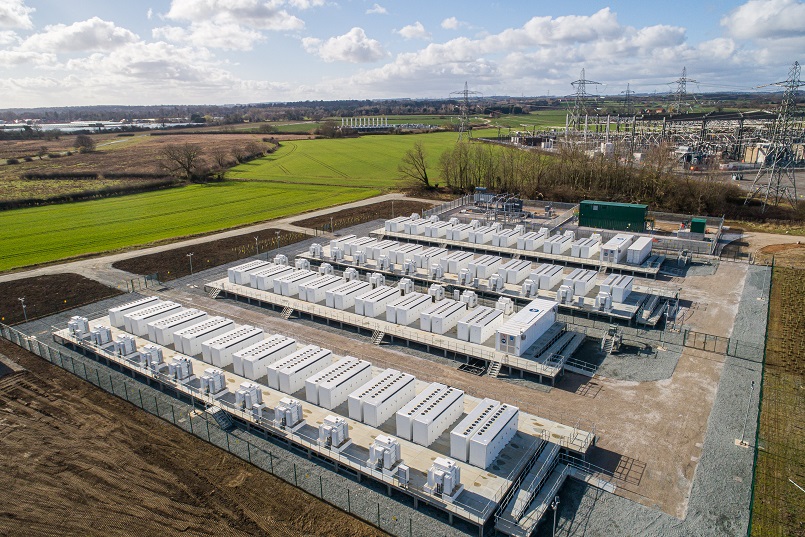
Harmony Energy Income Trust (HEIT) expects to receive offers for battery storage assets in its UK portfolio by the end of September.
This morning the investor, launched by battery energy storage system (BESS) developer Harmony Energy, issued an update for its unaudited Net Asset Value (NAV), a portfolio and operational update for the three months ended 31 July 2024.
It also updated on the asset sale, which was first announced in May. HEIT had scrapped its first quarter dividend and said the fund’s stock was being undervalued by markets, leading to its decision to appoint asset manager JLL to sell some, or all, of its portfolio.
HEIT said the sale process “is progressing” and that prospective bidders have shown “strong” interest. The group claimed indicative non-binding offers are expected to be received within the next month or so.
HEIT’s portfolio includes two of the biggest BESS projects in Europe, Pillswood and Bumpers, equally sized at 98MW/196MWh each. The eight project portfolio totals 395.4MW output to 790MWh capacity (all 2-hour duration assets), of which 79% (312.5MW/625MWh) is operational.
HEIT’s NAV fell slightly (-1.4%) to £215.43 million versus the £218.53 million reported as of the end of April. The latest NAV was equivalent to 94.84p per ordinary share, down by 1.37p per ordinary share since the previous reported period.
A negative mark-to-market valuation of a HEIT interest rate swap impacted the NAV, although the impact was partly offset by the energisation of the group’s 35MW/70MWh Rusholme project in Yorkshire during the period, which has now commenced trading.
Revenues for BESS assets on the grid in Great Britain (GB) have seen a downturn in the past year or so, based largely on market saturation for ancillary services. HEIT’s fellow UK-listed BESS investment funds, Gresham House Energy Storage Fund and Gore Street Capital have both reported challenges over 2024.
Low wind meant lower revenues in July
Early this year, Gresham House said there was a “weak revenue environment” in the GB market and that it would not announce any new projects during 2024.
As of the end of last year, market intelligence firm Modo Energy found average revenues for battery assets to have fallen 67% year-on-year across the market to £51k/MW/year.
Gore Street cut its dividend for the year ending 31 March 2025 after announcing its full-year financial results in July.
Although Gore Street said that its strategy of diversifying into international markets, including Germany and the US, had to some extent protected it from the impacts of falling revenues, its NAV per share was down year-on-year by 7.5%.
Gresham House did say the situation had improved somewhat from the lowest points in late 2023, when it reported full-year results in April, noting that average revenues for its operational BESS projects increased from £39.5k/MW/year in February 2024 to £77.9k/MW/year by mid-April.
At the end of June, in reporting its half-year for the period up to the end of April, HEIT said that “the worst is behind us and better, more profitable times lie ahead,” as it prepared to put three more income-generating assets into action.
However, for the three months ending 31 July, HEIT said lower wholesale market spreads meant revenues were at an average of £45.3k/MW/year, and said decreased wind generation on the GB grid during July in particular impacted BESS revenues across the market.
Low wind was coupled with low gas and carbon prices, reducing average monthly wholesale price spreads to 28% lower for July than June, while the lack of opportunity in the wholesale market drove higher competition for ancillary services, in turn lowering prices for those markets too.
Government emphasis on promoting renewables welcomed
There were some positives looking ahead, HEIT said. The trust welcomed the Labour government’s focus on renewables, as well as National Grid ESO’s recent publication of the Future Energy Scenarios (FES) 2024 document that emphasised the need for continued BESS buildout to support the electricity system.
The introduction of the ESO’s new Open Balancing Platform, aimed at automating market participation, has contributed to enabling higher capture volumes in the Balancing Mechanism (BM). BM spreads tend to be bigger than wholesale market spreads, and HEIT said this “helped cushion” the impact of falling wholesale market revenues.
While low wind production meant lower spreads and therefore lower revenues in July, August is already seeing higher levels of solar PV and wind on the grid, which HEIT said correlated with a marked improvement in revenues. It estimated that month-to-date revenues for August averaged £67.2k/MW/year in its portfolio.

